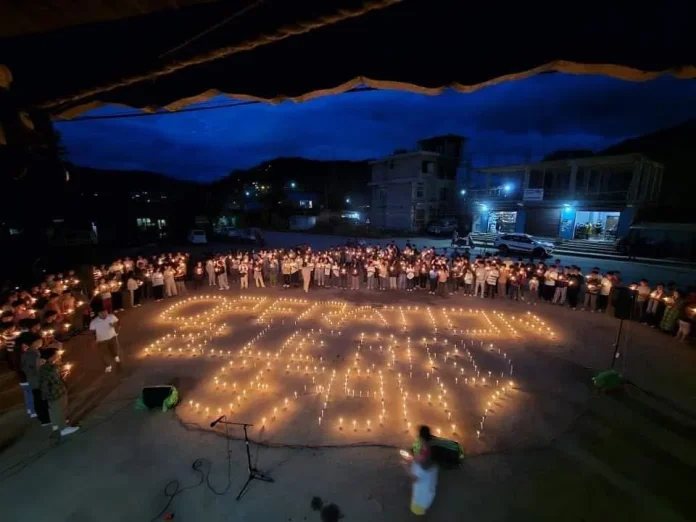SENAPATI, July 9: In a poignant and powerful ceremony, the 37th anniversary of Operation Bluebird was commemorated today at the Maram Union Secretariat Complex Old Monday Market, Senapati. The event, organised by the Naga Peoples Movement for Human Rights (NPMHR) and hosted by the Poumai Naga Union (PNU), brought together key Naga organisations and hundreds of participants.
The gathering revisited the events of July 9, 1987, when personnel of the Assam Rifles launched a counter-insurgency operation in and around Oinam village following an attack by NSCN-IM insurgents on an Assam Rifles outpost that left nine soldiers dead. In what was to become a months-long military campaign under the Armed Forces (Special Powers) Act (AFSPA), more than 30 villages were subjected to extensive operations that, according to testimonies and human rights reports, resulted in the deaths 27 civilians, 3 women raped, 5 others sexually molested, and 2 women were forced to give birth in full public view. Additionally, 340 villagers were tortured, 96 arbitrarily arrested and detained for weeks, 125 houses burned, 172 dismantled, 10 churches desecrated, and 6 schools destroyed.
Speaking at the 37th commemoration of the infamous “Operation Bluebird”, former NSF General Secretary Siipuno Ng. Philo revisited the trauma of what he called the “Great Battle of Oinam”. He narrated in chilling detail how, in the early morning of July 9, 1987, personnel of the Assam Rifles descended upon Oinam village and over 30 surrounding villages with sweeping brutality after insurgents of the National Socialist Council of Nagaland (NSCN-IM) attacked an Assam Rifles outpost, killing nine soldiers and looting arms.
“We acknowledge the ongoing struggles of the families and communities affected by Operation Bluebird and reaffirm our commitment to supporting their quest for truth and justice and to put an end to impunity, once and for all. May the memories of the victims and martyrs of Operation Bluebird inspire us to work towards a more just and peaceful society. May their sacrifice not be in vain, and may their legacy fuel our pursuit of human rights, dignity, and accountability for all,” he said.
NPMHR Secretary General Neingulo Krome underscored the calculated nature of the operation and the systemic assault on civilians under the cover of AFSPA (Armed Forces Special Powers Act). “The brutality is what gave birth to the NPMHR,” he said, adding, “Justice remains elusive even after 37 years.” Despite multiple petitions and a five-year legal hearing process in the Supreme Court that generated thousands of pages of documentation, no final hearing ever took place. Judges were transferred, and the case remains unresolved.
Speaking to the gathering, Krome emphasized, “We will get justice only when we get our freedom—freedom from occupation, from bondage, and from all forms of human rights violations.”
Former President of UNC, L. Adani stated that “Operation Bluebird was launched not to nab the NSCN-IM, but to avenge their anger on the innocent civilians.”
The event saw solidarity expressed by several organisations including the United Naga Council (UNC), Naga Students’ Federation (NSF), Naga Women Union (NWU), All Naga Students’ Association Manipur (ANSAM), and Naga Peoples Organisation (NPO). Performances such as “Song of the Hornbill” by Guru Rewben Mashangva and “Oinam” by Baby Kuvahne Paokhomai added a poignant cultural dimension to the remembrance.
Civil society representatives resolved to continue seeking justice through national and international human rights platforms, reaffirming the spirit behind the commemoration: “Lest We Forget.”

